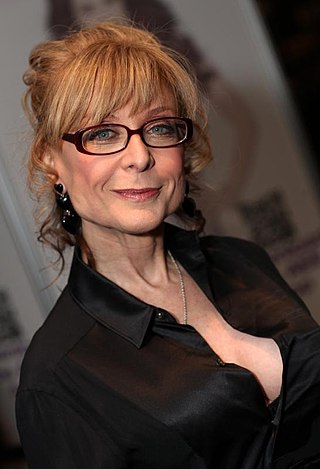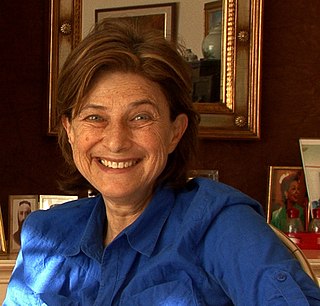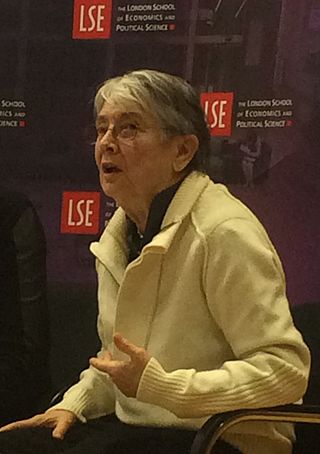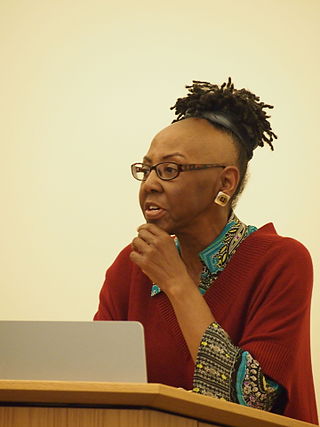Feminist film theory is a theoretical film criticism derived from feminist politics and feminist theory influenced by second-wave feminism and brought about around the 1970s in the United States. With the advancements in film throughout the years feminist film theory has developed and changed to analyse the current ways of film and also go back to analyse films past. Feminists have many approaches to cinema analysis, regarding the film elements analyzed and their theoretical underpinnings.
Feminist science fiction is a subgenre of science fiction focused on such feminist themes as: gender inequality, sexuality, race, economics, reproduction, and environment. Feminist SF is political because of its tendency to critique the dominant culture. Some of the most notable feminist science fiction works have illustrated these themes using utopias to explore a society in which gender differences or gender power imbalances do not exist, or dystopias to explore worlds in which gender inequalities are intensified, thus asserting a need for feminist work to continue.
Science fiction and fantasy serve as important vehicles for feminist thought, particularly as bridges between theory and practice. No other genres so actively invite representations of the ultimate goals of feminism: worlds free of sexism, worlds in which women's contributions are recognized and valued, worlds that explore the diversity of women's desire and sexuality, and worlds that move beyond gender.

Joanna Russ was an American writer, academic and feminist. She is the author of a number of works of science fiction, fantasy and feminist literary criticism such as How to Suppress Women's Writing, as well as a contemporary novel, On Strike Against God, and one children's book, Kittatinny. She is best known for The Female Man, a novel combining utopian fiction and satire, and the story "When It Changed".

Gloria Jean Watkins, better known by her pen name bell hooks, was an American author, theorist, educator, and social critic who was a Distinguished Professor in Residence at Berea College. She was best known for her writings on race, feminism, and class. She used the lower-case spelling of her name to decenter herself and draw attention to her work instead. The focus of hooks' writing was to explore the intersectionality of race, capitalism, and gender, and what she described as their ability to produce and perpetuate systems of oppression and class domination. She published around 40 books, including works that ranged from essays, poetry, and children's books. She published numerous scholarly articles, appeared in documentary films, and participated in public lectures. Her work addressed love, race, social class, gender, art, history, sexuality, mass media, and feminism.

Marie Louise Hartman, known professionally as Nina Hartley, is an American pornographic film actress and sex educator. By 2017 she had appeared in more than one thousand adult films. She has been described by Las Vegas Weekly as an "outspoken feminist" and "advocate for sexual freedom", and by CNBC as "a legend in the adult world".

Chantal Anne Akerman was a Belgian film director, screenwriter, artist, and film professor at the City College of New York.

Teresa de Lauretis is an Italian author and Distinguished Professor Emerita of the History of Consciousness at the University of California, Santa Cruz. Her areas of interest include semiotics, psychoanalysis, film theory, literary theory, feminism, women's studies, lesbian- and queer studies. She has also written on science fiction. Fluent in English and Italian, she writes in both languages. Additionally, her work has been translated into sixteen other languages.

Barbara Jean Hammer was an American feminist film director, producer, writer, and cinematographer. She is known for being one of the pioneers of the lesbian film genre, and her career spanned over 50 years. Hammer is known for having created experimental films dealing with women's issues such as gender roles, lesbian relationships, coping with aging, and family life. She resided in New York City and Kerhonkson, New York, and taught each summer at the European Graduate School.
Michele Faith Wallace is a black feminist author, cultural critic, and daughter of artist Faith Ringgold. She is best known for her 1979 book Black Macho and the Myth of the Superwoman. Wallace's writings on literature, art, film, and popular culture have been widely published and have made her a leader of African-American intellectuals. She is a Professor of English at the City College of New York and the Graduate Center of the City University of New York (CUNY).

Gwendolyn Audrey Foster is an experimental filmmaker, artist and author. She is Willa Cather Professor Emerita in Film Studies. Her work has focused on gender, race, ecofeminism, queer sexuality, eco-theory, and class studies. From 1999 through the end of 2014, she was co-editor along with Wheeler Winston Dixon of the Quarterly Review of Film and Video. In 2016, she was named Willa Cather Endowed Professor of English at the University of Nebraska at Lincoln and took early retirement in 2020.

Alix Kates Shulman is an American writer of fiction, memoirs, and essays, and a prominent early radical activist of second-wave feminism. She is best-known for her bestselling debut adult novel, Memoirs of an Ex-Prom Queen, hailed by the Oxford Companion to Women's Writing as "the first important novel to emerge from the Women's Liberation Movement."
Elana Dykewomon was an American lesbian activist, author, editor, and teacher. She was a recipient of the Lambda Literary Award for Lesbian Fiction.

Nitrate Kisses is a 1992 experimental documentary film directed by Barbara Hammer. According to Hammer, it is an exploration of the repression and marginalization of LGBT people since the First World War. To celebrate the 30th anniversary of the Teddy Awards, the film was selected to be shown at the 66th Berlin International Film Festival in February 2016.

Christine Delphy is a French feminist sociologist, writer and theorist. Known for pioneering materialist feminism, she co-founded the French women's liberation movement in 1970 and the journal Nouvelles questions féministes with Simone de Beauvoir in 1981.
Celine Parreñas Shimizu is a filmmaker and film scholar. She is well known for her work on race, sexuality and representations. She is currently Dean of the Arts Division at the University of California at Santa Cruz.
For the Canadian writer and editor, see Nancy Bauer.
Lilly Rivlin is an American- Israeli journalist, writer, and filmmaker in the genre of documentary/ political films on women's issues.
Annette Frieda Kuhn, FBA is a British author, cultural historian, educator, researcher, editor and feminist. She is known for her work in screen studies, visual culture, film history and cultural memory. She is Professor and Research Fellow in Film Studies at Queen Mary University of London.

Michelle Parkerson is an American filmmaker and academic. She is an assistant professor in Film and Media Arts at Temple University and has been an independent film/video maker since the 1980s, focusing particularly on feminist, LGBT, and political activism and issues.
I Was A Teenage Feminist is an documentary film directed by Therese Shechter, produced by UpFront Productions and distributed by Women Make Movies. The title is a play on that of the 1957 horror movie, I Was a Teenage Werewolf. The film explores the marked discomfort among many young, progressive women to identify themselves as feminists and how that discomfort came to be. Through personal narrative as well as interviews with feminist icons and everyday women and men, Shechter's film documents a complex, multi-generational look at feminist identity in today's world. The film had its television premiere on March 8, 2005 Canada's W Network, and it won Best Film at the National Council of Jewish Women Film Festival and Special Mention at the Karachi International Film Festival in 2006.










